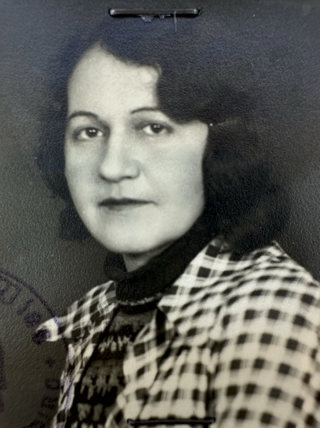Dr. Aloisia Franziska (Luise) Wottle

Personalia
Born:
Died:
Profession:
Persecution:
Imprisonment 29.10.1938 - 17.11.1939,
Ravensbrück concentration camp 17.11.1939 - December 1941
Memberships
Curriculum Vitae
Aloisia Franziska Wottle, also known as Luise, was born in Vienna's 16th district as one of four legitimate children of the industrialist Johann Wottle and Caroline, née Saar. After completing elementary school, she attended the Sacre-Coeur Catholic private school in Vienna's 3rd district, where she graduated in 1926. She then attended the Academy of Music and Performing Arts, majoring in piano, harmony, counterpoint and composition. In 1929, she completed this training with a teaching qualification in music for secondary schools and teacher training colleges.
In 1930, Aloisia Wottle enrolled in philosophy, aesthetics and musicology at the University of Vienna, but had to interrupt her studies in 1932 due to the bankruptcy of her father's factories, the Eisenwerk Favoriten and the Maschinenfabrik Hans Wottle. She spent the next few years in Poland, Luxembourg, France and the Netherlands, giving language lessons, tutoring and working as an office assistant.
In 1937, she returned and worked for the magazine Agence Telegrafique de la presse, published by a later emigrant.
As an editor, Aloisia Wottle witnessed the downfall of a free and independent Austria when German troops marched in on March 12, 1938. As an opponent of National Socialism, she continued to write the articles 'The Black Sunday', 'Gesinnungsterror' and 'Nazi unter sich' for this magazine anonymously after the invasion.
Soon afterwards, Aloisia Wottle wrote the poems 'Wer ist des Grusses wert?' and 'Gebet'.
Who is worthy of the greeting?
Only those who have committed treason against Austria's people and country, greet them with Heil Hitler and a raised hand!
Only those who have broken the oath, a "true German" man, greet them with Heil Hitler, for it is their business!
Only he who denies the faith, who takes away the rights of the church, greet him with Heil Hitler, he is worthy of the salute!
Prayer
Almighty there above the stars, heal Hitler from his megalomania, and make that in not too distant days, Austria can breathe again.
Heal Hitler from his superstition that law and violence are the same thing, and that through terror, murder and robbery, a peaceful brother country can be liberated.
Heal Hitler and let him finally realize that the screamers in Austria, who are running through the streets like blind hordes, are just immature school politicians.
Hail Hitler so that he at least realizes that Austria is far from being Prussia, and that despite the swastika flag, it still does not forget its culture.
Hail Hitler and his party comrades, clear their minds, soften their hearts, that the blood of our chancellor has not flowed uselessly for an independent Austria.
Comrade!
Even if the German salute is obligatory today, do not let yourself be put off by it in future. Because, if you think of this poem, you can greet Heil Hitler with a smile on your face.
Aloisia Wottle passes these poems on to her two sisters Emma and Hedwig Wottle, who pass them on directly or indirectly to Irma Schobel, Gustav Rotter, Vera Schwarz, Edith Breuer, Aloisia Kellner, Mathilde Haslauer, Kurt Jelinek, Marie Regner and Alfred Perner.
During a Gestapo search of Kurt Jelinek's house, the poems were found and returned to Aloisia Wottle.
On October 29, 1938, Aloisia Wottle was arrested by the Gestapo. Even while in custody, she tried to smuggle out articles critical of the Nazis about her sister Emma Wottle, who was also imprisoned.
Aloisia Wottle was taken into 'protective custody' by the Vienna Regional Court for preparation for high treason and deported to the Ravensbrück concentration camp on November 17, 1939. In her block, she was the bedmate of the socialist resistance fighter Rosa Jochmann. The psychological injuries inflicted on Aloisia Wottle in Ravensbrück concentration camp would stay with her for the rest of her life. She was finally released from prison around Christmas 1941.
In 1942, Aloisia Wottle resumed her studies at the University of Vienna. She received her doctorate immediately after the liberation of Austria in July 1945. The title of her dissertation was The Aesthetic Object.
After the war, Aloisa Wottle worked in the editorial offices of various magazines, but the psychological abuse she experienced in Ravensbrück concentration camp forced her to repeatedly spend time in mental hospitals and ultimately became unable to work.
Aloisia Wottle died unmarried and childless at the age of 82 in Tulln in Lower Austria.
Places
Residence:
Persecution:
Citations
Dokumentationsarchiv des österreichischen Widerstands (DÖW)
Landesarchiv Niederösterreich
Archiv Universität Wien
Matricula Online
